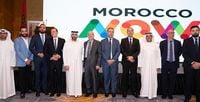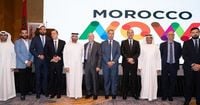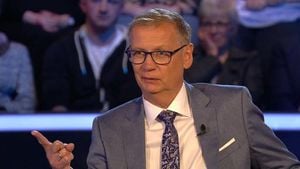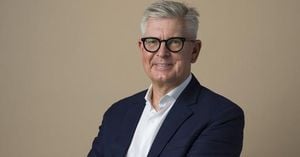During the Annual Investment Meeting (AIM) held from April 7 to April 9, 2025, at the Abu Dhabi Exhibition Center (ADNEC), the Moroccan Agency for Investment and Export Development (AMDIE) organized the economic day "Morocco Now." This event focused on strengthening the strategic partnership between Morocco and the United Arab Emirates under the theme "From Vision to Action: Morocco & UAE shaping a bright future together." It brought together leading economic players from both countries, including representatives from the public and private sectors and members of the Moroccan diaspora in the Gulf region.
The initiative aligns with Morocco's national strategy for the development of private investment, aiming to position the Kingdom as a regional hub for investment and export towards Africa and the Euro-Mediterranean area. The event highlighted various reforms, high-potential sectors, and concrete projects that could lead to mutually beneficial partnerships.
High-profile institutional figures attended the event, including the Ambassador of King Mohammed VI to the UAE, the Minister Delegate to the Head of Government in charge of Investment, Convergence, and Evaluation of Public Policies, the Director General of AMDIE, the Director General of the Caisse de Dépôt et de Gestion (CDG), the President of the General Confederation of Moroccan Enterprises (CGEM), the Director of the Casablanca Stock Exchange, and the Director of Business Development and African Cooperation at Casablanca Finance City (CFC). This strong mobilization underscores the strategic importance Morocco places on its economic relations with the UAE, a key partner in the region and an ally in building a shared future based on mutual prosperity.
In a recorded speech broadcast during the meeting, Karim Zidane, the Minister Delegate for Investment, emphasized the significant strategic relations between Morocco and the UAE, which have been elevated to an exemplary partnership under the leadership of His Majesty King Mohammed VI and His Highness Sheikh Mohammed bin Zayed Al Nahyan. He noted that the UAE is the second-largest foreign investor in Morocco and the largest among Gulf countries, with direct investments totaling an estimated 118 billion dirhams (MMDH) by the end of 2022, and a flow of 2.3 MMDH for 2023 alone.
This economic day also served to showcase Morocco's high value-added investment opportunities across various sectors, bolstered by a new legislative and regulatory framework dedicated to investments. Zidane highlighted that the partnership was further solidified with the signing of a Comprehensive Economic Partnership Agreement (CEPA) between Rabat and Abu Dhabi in 2024, marking a pivotal moment in enhancing bilateral cooperation. This agreement illustrates the commitment of both nations to strengthen trade exchanges, encourage investments, and stimulate economic partnerships in high-potential sectors.
Ahmed Tazi, the Moroccan ambassador to the UAE, reiterated Morocco's reliability as a partner for investors. He praised the recent first meeting of the Morocco-UAE Business Council held in Sharjah, which is expected to spur new projects beneficial to both countries. He emphasized that both nations are driven by a strong desire to promote economic relations within a framework of complementarity and solidarity, initiated under the leadership of the late King Hassan II and the late Sheikh Zayed bin Sultan Al Nahyan.
During the economic day, a memorandum of understanding was signed between the Emirati company Al Ghaith Holding and AMDIE. Key speakers, including Ali Seddiki, the Director General of AMDIE, Khalid Safir, the Director General of CDG, Chakib Alj, the President of CGEM, and Tarik Senhaji, the Director General of the Casablanca Stock Exchange, emphasized the progress made by Morocco in infrastructure development related to transport, renewable energy, and industry.
This event reflects Morocco's ambitious strategy to strengthen its position as a competitive, sustainable, inclusive, and open investment hub on both international and continental scales. This strategy is built on five fundamental pillars: a stable political and economic environment, the adoption of an innovative and ambitious energy strategy, the development of infrastructure that meets global standards, the implementation of an open and ambitious trade policy, and the availability of highly qualified human capital.
As Morocco continues to diversify its economic partnerships, the "Morocco Now" event serves as a crucial platform for fostering collaboration and investment opportunities between Morocco and the UAE. The proactive approach taken by both nations aims to create a robust economic landscape that benefits not only their respective countries but also the broader region.





